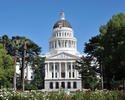Here in California we’ve just received our first rain since last winter after another brutal round of massive forest fires. Our Mediterranean style climate cycles from a long dry hot period to a few short cool wet winter months. October is our most fire prone time of year. It’s hot, the earth is bone dry, the vegetation is brittle, and windstorms stir up fires like a giant hair dryer. Cyclical burns are part of the ecosystem here and are normal and necessary. read more »
Housing
Report: California Getting In Its Own Way
Although Governor Gavin Newsom promised to deliver 3.5 million new housing units in eight years, California severely missed this mark: as reported by the Public Policy Institute of California, housing production actually decreased during each of the past 2 years, and in 2019 is on track to fall about 80% short of the annual mark required to build 3.5 million new homes in 8 years. At this pace, it will take 39.6 years for the Governor to achieve his 8-year goal. read more »
- Login to post comments
The Middle Class Rebellion
We usually associate rebellions with the rise of the desperate. But increasingly we are seeing large protests in comparatively wealthy countries that are led not by working class sans-culottes or starving peasants, but what was once the stable middle class. read more »
- Login to post comments
Affordability, Housing Shortages and the Coming Population Boom
Housing affordability and dwelling shortages back to centre stage
The combined issues of housing affordability and dwelling shortages are once again emerging as key issues for the property industry, policy makers and the broader community.
Recent cyclical and relatively short-term movements in the property market – where we’ve moved from boom to moderation to a rebound again – have dominated discussion in recent years. read more »
- Login to post comments
Stomping On the Suburbs
Our way of life is a miracle for this kind of world, and … the danger lies in thinking that of it as ‘natural’ and likely to endure without a passionate determination on our part to preserve and defend it.” — W.V. Aughterson, The Australian Way of Life, 1951
For generations, Australia has enjoyed among the highest living standards in the world. The “Australian dream”, embodied largely by owning a single-family home with a small backyard, included well over 70 per cent of households. read more »
- Login to post comments
The Expanding and Dispersing San Francisco Bay Area
This decade has witnessed an unprecedented expansion of the Greater San Francisco Bay Area (the San Jose-San Francisco combined statistical area or CSA), with the addition of three Central Valley metropolitan areas, Stockton, Modesto and Merced. Over the same period, there has been both a drop in the population growth rate and a shift of growth to the Central Valley exurban metropolitan areas. read more »
- Login to post comments
Forced Upzoning is Bad Policy, But Here's How We Can Mitigate its Impacts
A number of bills in the legislature would attempt to “solve” the state’s housing challenges by overriding local municipal zoning ordinances and statutorily allowing developers to build up to Sacramento-mandated levels of density. The most notable of these bills is SB50, which has no provisions to make any of the housing built affordable, but espouses a “trickle-down” theory which suggests that market-rate (i.e. luxury) housing will “filter” down to create more affordable housing. read more »
- Login to post comments
Organic Urbanism is the Cure for New Urbanism
New Urbanism is like a virus. For 50 years it keeps coming back in mutated forms. It needs a cure. read more »
- Login to post comments
Even Before the Blackouts, Most Californians Considered Leaving
For virtually all of its history from statehood in 1850 to 2000, California was a magnet drawing households from the rest of the United States for better lives. Indeed, in a nation that had its "American Dream," California had its own "California Dream." There was no Oregon dream, despite its mountains , seashore and proximity to California, nor was there a Maine or South Carolina dream. read more »
- Login to post comments
Down Payment Takes Half a Century in Vancouver: Report
As a recently released Organization for International Cooperation and Development (OECD) noted, house prices have been generally rising far in excess of incomes in a number of nations (Under Pressure: The Squeezed Middle Class). OECD finds that these rapidly rising house prices have been a principal contributorto rising cost of living that has already resulted in economic reversals for the middle-class. read more »
- Login to post comments





















